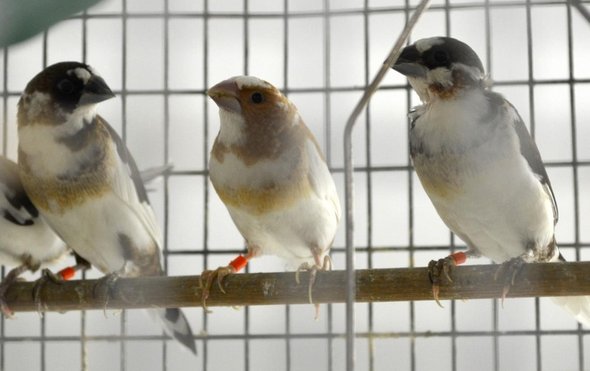This is Scientific American — 60-Second Science. I'm Christopher Intagliata.
In the most recent podcast we discussed how baby bats learn their calls from all the other bats in their crowded colonies. And we mentioned in passing that songbirds usually get tutored directory from their dads. So, how does that avian system work?
"At about 25 days, the father starts singing in many cases directly to the juvenile." David Mets, a geneticist at the University of California San Francisco. "That is the onset of what's called the sensory phase of learning. Where they incorporate information from their environment."
What Mets and his team wanted to know was how much of a baby bird's future musicality is influenced by that tutoring...an environmental factor...and how much is written in their genes. So they studied Bengalese finches... which sing like this. (finch clip 1)
The tempo of that song appears to vary, according to a finch's genetics. So they tried training baby finches, with different genetic tendencies — fast, medium or slow singing — on a synthetic finch song, made from a library of different types of song syllables. "So this is sort of maybe tonal downward sweeps, (whistle) you know. . Or sort of broadband noisy ones, like sshhhh."

But when baby finches with different genetic backgrounds were trained on the resulting tune (training song), the training didn't stick. Instead, the greatest predictor of their singing tempo was the way their fathers sang—which they'd never heard. So their genes seemed to be in charge.
But then Mets flipped the experiment—exposing genetically similar birds to actual live birds that sang fast, medium, or slow. And that live training appears to have been compelling enough to override the influence of the birds' genetics. So that genetically identical chicks sang tunes fast (fast clip) medium (medium clip) or slow (slow clip)...depending what their tutor sang. The results are in the Proceedings of the National Academy of Sciences.
The study suggests that the right kind of schooling...or environmental influences... might be able to overcome 'baked in' genetic influence on certain traits. And Mets says this push-pull of nature versus nurture might hold true for humans, too.
"We're moving very rapidly into a period where genetic data is easier and easier to collect. And an understanding of these kinds of gene-environment push/pull interactions, and how they impact ultimate phenotypic outcomes, is going to be important in understanding things like cancer susceptibility." Because that too has both genetic and environmental factors.
But no word yet on whether the genetic influences of an off-tempo human father...can be conquered with enough training.
Thanks for listening for Scientific American — 60-Second Science. I'm Christopher Intagliata.












